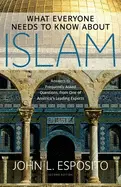
What Everyone Needs to Know about Islam - by John L. Esposito
ISBN: 0199794138Date read: 2022-07-13
How strongly I recommend it: 7/10
(See my list of 430+ books, for more.)
Go to the Amazon page for details and reviews.
Great clear introduction to Islam in an FAQ format. Common question, simple answer. Common question, simple answer. Almost every question was one I had considered once, but never actually asked. The book is not deep — just a high-level overview, which I found useful and fascinating.
my notes
Islam is the second largest religion in the world.
Two major branches, Sunni (85 percent of the world’s Muslims) and Shii (15 percent).
Like Jews and Christians, Muslims are monotheists.
Muslims believe in the prophets of the Hebrew Bible, including Abraham and Moses, and of the New Testament, Jesus and John the Baptist.
They also believe in angels, heaven, hell, and the Day of Judgment.
The Quran is the Muslim scripture. It contains the revelations received by the Prophet Muhammad from God through the angel Gabriel.
Therefore, the Quran is the eternal, literal word of God.
Recitation reinforces what Muslims see as the miracle of hearing the actual word of God expressed by the human voice. They memorize and recite the Quran in Arabic.
For Islam, no aspect of life is outside the realm of religion.
Muhammad was and is the model of the Muslim ideal to be emulated by all believers.
Muslims believe that they are members of a worldwide Muslim community, known as the ummah.
Islam was revealed in a time and place in which tribal loyalty was considered a person’s most important identification. The individual’s status was based upon membership in a particular tribe. Islam declared the absolute equality of all believers. The primary identity of the Muslim was as a Muslim, rather than as a member of a tribe, ethnicity, or gender. This notion of radical egalitarianism shattered the importance of tribal identities and fostered the belief that Muslims should always defend and protect other Muslims.
Muslims pray/worship five times throughout the day: at daybreak, noon, midafternoon, sunset, and evening.
Ramadan, the ninth month of the Islamic calendar: a month-long fast, must abstain from dawn to sunset from food, drink, and sex.
Five obligatory prayers have to be performed in Arabic, regardless of the native tongue of the worshipper.
The Quran’s comprehensive and integrated view of life contrasts with Christianity’s tendency to compartmentalize life into the sacred and profane.
Mary is mentioned more times in the Quran than in the entire New Testament. The Quran upholds Mary as one of the four perfect examples of womanhood.
Eid Holiday: two and a half months after the Breaking of the Fast of Ramadan, extends for four days. This is the Eid al-Adha.
Sunni Muslims believe that because Muhammad did not designate a successor, the best or most qualified person should be either selected or elected as leader (caliph), as the political leader only, as the protector of the faith.
Shiis believe that succession to the leadership should be hereditary, passed down to Muhammad’s male descendants, to serve as both religious and political leaders.
Shiis consider the sayings, deeds, and writings of their Imams to be authoritative religious texts.
Sunnis experienced a glorious and victorious history under the Four Rightly Guided Caliphs and the expansion and development of Muslim empires under the Umayyad and Abbasid dynasties. Sunnis can thus claim a golden age in which they were a great world power and civilization, which they see as evidence of God’s guidance and the truth of the mission of Islam. Shiis see in this time period the illegitimate usurpation of power by the Sunnis at the expense of creating a just society.
Islamic law developed in response to the concrete realities of daily life.
Today, there are four major Sunni law schools (Hanafi, Hanbali, Maliki, and Shafii) and two major Shii schools (Jafari and Zaydis). The Hanafi came to predominate in the Arab world and South Asia; the Maliki in North, Central, and West Africa; the Shafii in East Africa and Southeast Asia; and the Hanbali in Saudi Arabia. Muslims are free to follow any law school but usually select the one that predominates in the area in which they are born or live.
Source of law, ijma, originated from Muhammad’s reported saying, “My community will never agree on an error.”
Muhammad’s death was in 632.
For four centuries (1600-2000), much of the Islamic world was dominated by European colonialism. Religions, like countries, under “siege” tend to focus on survival, preserving and protecting what they have, rather than seeking and accepting change. Thus Islamic calls for reform are often labeled by opponents as simply attempts to Westernize Islam.
When conservatives try to preserve Islam, they often do not distinguish between revealed sources of faith and socially conditioned human interpretations historically preserved in manuals of Islamic law and theology. In contrast, reformers stress the difference between divinely mandated beliefs, practices, and laws and human interpretations from the past.
Islam is similar to Judaism in its emphasis on practice rather than belief, on law rather than dogma.
Muslim rule in Spain (al-Andalus) from 756 to about 1000, is usually idealized as a period of inter-faith harmony.
Muslims greet each other with the Arabic phrase As-salaam alaykum, “Peace be upon you,” to which the appropriate response is Wa-alaykum as-salaam, “And peace be upon you also.”